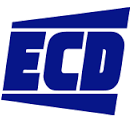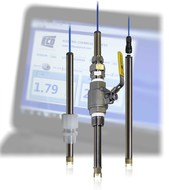 Electro-Chemical Devices has released DS80 intelligent sensors. Equipment and systems design engineers who need specialized analytical measurement sensors will find the advanced DS80 Intelligent Sensor Series features a standard modular design, which can be customized for the accurate and reliable measurement of pH, ORP, DO, conductivity, resistivity and numerous specific ions.
Electro-Chemical Devices has released DS80 intelligent sensors. Equipment and systems design engineers who need specialized analytical measurement sensors will find the advanced DS80 Intelligent Sensor Series features a standard modular design, which can be customized for the accurate and reliable measurement of pH, ORP, DO, conductivity, resistivity and numerous specific ions.
 With their replaceable cartridge sensors, the DS80 Intelligent Sensors provide multi-parameter analytical measurement. They can be customized for a range of industrial application-specific measurements in rugged environments to perform unique tasks.
With their replaceable cartridge sensors, the DS80 Intelligent Sensors provide multi-parameter analytical measurement. They can be customized for a range of industrial application-specific measurements in rugged environments to perform unique tasks.
ECD’s intelligent digital Model DS80 Sensors store and identify calibration information. They also communicate via MODBUS RTU with the ability to connect directly to a programmable logic controller (PLC) or a computer with a MODBUS RTU emulator. They are ideal for specialized OEM equipment devices or large, complex distributed control systems (DCS).
To measure pH, the Model DS80 Intelligent Sensors are designed with replaceable electrode cartridges. They are available in a range of sensor styles. These sensors feature rugged Radel (PES) or PEEK construction with single tine, double tine or full crown style pH bulb protection. A choice of bulb styles is available too, including high response spherical bulbs, hemispherical bulbs or flat surface bulbs. Additional options are porous Teflon and ceramic junctions with various electrolytes.
With their design, specific ion electrode sensors from ECD are far from limited only to laboratory use. They continuously measure ammonium, bromide, cadmium, calcium, chloride, cyanide, cupric, fluoride, lead, nitrate, nitrite, potassium, sodium, sulfide and sulfur.
ECD’s specific ion electrodes measure the concentration of the ion in the solution—the “free” ion rather than a complexed version. Cyanide, fluoride and sulfide ions, for example, only exist in a specific pH range as free ions and outside this pH range some percentage of the total concentration is complexed as H(X), which is not seen by the sensor. These measurements are pH compensated with a pH sensor on a second channel to determine the total ion concentration with the dissociation curve for the specific chemical under measurement.
For conductivity measurement, the industry’s two primary technologies are both available from ECD. Contacting conductivity sensors require an impedance measurement made between two metal contacts in the solution. For inductive conductivity sensors, two toroidal cells inside the sensor are inductively coupled through the solutions conductivity.
Inductive sensors manufactured by ECD for conductivity measurement excel in the higher conductivity ranges and where coating is a problem. Their chemically resistant PVDF (KYNAR) body is excellent for corrosive operating environments.
Contacting sensors manufactured by ECD for conductivity measurement can measure to very low to high levels. They are, however, subject to coating issues and are not suitable for corrosive environments.
The DS80 Sensors are available in two universal package designs: insertion/submersion or valve retractable with flared-end to prevent blowout. The Model DS80 sensors have a 075-inch OD 316 stainless steel body with a 10-foot cable or an optional waterproof detachable cable assembly. Additional options include high temperature configurations and much more.
For more information, visit Electro-Chemical Devices website.
